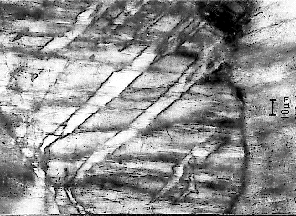

(Mg,Fe)SiO3 perovskite is the most abundant mineral in the Earth's interior. An understanding of its deformation mechanisms is thus critical to constrain the rheological behavior of the Earth's lower mantle.
We synthesised MgSiO3 perovskite from a glass of the same composition loaded into a rhenium capsule and held at 25 GPa and 1600°C for 280 min. After the experiment, the specimen was recovered and the end caps were removed. Raman spectroscopy was used to clarify that perovskite had been synthesized. The specimen was then placed in a second assembly designed to induce plastic deformation. This assembly is based on the same design as used previously but it had to be re-scaled to fit in a 10/4 octahedron to reach the higher pressure range. Three deformation experiments have been run at different temperatures: 1000, 1400 and 1800°C. In a fourth experiment, the perovskite specimen was loaded to the working pressure, but not heated.
Figure 3.1-18 shows an optical micrograph under crossed nicols of a specimen deformed at 1400°C. The synthesis stage resulted in a coarse grained material with grains as big as 300-400 µm. The grains also exhibit numerous twins that appear to be sheared by deformation bands. These sharp deformation bands suggest that dislocation glide is the active deformation mechanism. As there was no evidence of deformation in the unheated specimen, we conclude that plastic deformation is a result of the high temperature episode. The fact that the twins are sheared shows that they did exist at high P and T and did not form upon cooling. This confirms that MgSiO3 perovskite is orthorhombic under uppermost lower mantle conditions.
 |
Fig. 3.1-18: Optical micrograph (transmitted polarised light) showing twins sheared by sharp deformation bands. |

Tel: +49-(0) 921 55 3700 / 3766, Fax: +49-(0) 921 55 3769, E-mail: bayerisches.geoinstitut(at)uni-bayreuth.de
 Previous page
Previous page